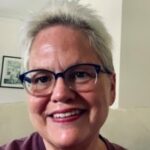 by Katrina Landon, WUU Board President
by Katrina Landon, WUU Board President
Eighteen months of Covid isolation has taken its toll on both our individual and congregational lives. For myself, this prolonged period of solitude allowed me more time for meditation, carefree Frisbee games with my dogs, and an opportunity to gain a deeper understanding of my own humanness. Zoom allowed me to teach from home, attend WUU services and events, and during my nephew’s terminal fight with cancer it allowed my far-flung family to be of great comfort to each other across the miles. While technology helped to bring my family closer, the same cannot be said about some of my relationships with those within our WUU family. As we began to turn off our screens during services and meetings I noticed that I began to feel an increasing disconnect from those I once believed my allies. It became easier for me to objectify the names and faces on a screen as well as lose sight of the fact that those names and faces were real people with real emotional and spiritual needs. I don’t like admitting this about myself, but I have to wonder how many others noticed this happening within themselves?
This is not an indictment against our use of Zoom so much as a reflection upon myself, and as a member of our liberal faith. Very soon, we will be returning to onsite events and services. Have you found yourself feeling like me? Has it impacted your relationships with those faces or names on a screen? Will you be ready to forgive others for real or imagined hurts, or be willing to ask forgiveness from those you have hurt? Will you be ready to face your own humanness? Facing my own has been no easy task. It has forced me to reach out and have conversations with those I don’t understand, have patience with those who appear entrenched in a viewpoint different than my own, but above all forgive myself, as well as others, for stumbling into the weeds of our humanness.
It is my hope that in the days and weeks to come we will all take time to reflect and reconnect, forgive and forget, and acknowledge gratitude to those who have helped us to understand our brittle humanness. May this time in our congregational life serve as a learning tool that will help us to become better people, and better UUs. In closing, I would like to share these words of hope sent to me by Allen Cooke, “In each of us there is a spark that can reverse the trends of violence and depression spiraling within us and in the world around us. By setting in motion the spiral of gratefulness we begin the journey towards peace and joy.” — Br. David Steindl-Rast
